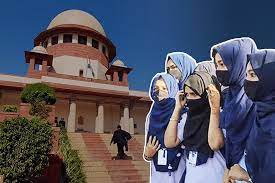Split over hijab: On the Supreme Court verdict
The Supreme Court of India’s verdict on the head-scarf case should not lead to denial of education rights
A two-judge Bench of the Supreme Court has been unable to resolve the conflict between a girl student’s freedom to wear a head-scarf and the state’s interest in keeping schools a place of equality and secularism. It is unfortunate that a clear verdict did not emerge from the elaborate arguments advanced before the Court for and against the Karnataka government’s bar on the wearing of the hijab. The split verdict perhaps reflects the division in the wider society on issues concerning secularism and the minorities. Justice Hemant Gupta, rejecting the idea that hijab could be worn in addition to the uniform, has held that permitting one community to wear religious symbols to class will be the antithesis of secularism. Justice Sudhanshu Dhulia, on the other hand, has ruled that asking to remove the head-scarf at an institution’s gates is an invasion of their privacy and dignity. The issue is why a head-scarf that does not interfere with the uniform cannot be a matter of choice without being a target of hostile discrimination; and whether the hijab is going to be used to deny girl students their right to education. Justice Dhulia represents this viewpoint when he asserts that discipline should not be at the cost of freedom, when he wonders why a girl child wearing a hijab should be a public order problem and declares that ‘reasonable accommodation’ of this practice will be a sign of a mature society. He also empathises with the position of girl students who have to overcome greater odds than boys to get an education.
Justice Gupta, on the other hand, has foregrounded equality and discipline as the essential hallmarks of a secular institution in a diverse country, and rules that the Government violates no constitutional principle when enforcing a prescribed uniform. He goes to the extent of saying the constitutional goal of fraternity would be defeated if students are permitted to carry their apparent religious symbols with them to the classroom. The split verdict has given rise to the question of whether matters on which opinions could be sharply divided and have significant political implications should be placed before Division Benches of even number. In the prevailing political climate, the Karnataka government mandating either a prescribed uniform or any dress that was “in the interest of unity, equality and public order” was seen as majoritarian assertion in the garb of enforcing secular norms, equality and discipline in educational institutions. A verdict that legitimises this non-inclusive approach to education and a policy that may lead to denial of opportunity to Muslim women will not be in the country’s interest. Reasonable accommodation should be the course as long as the hijab or any wear, religious or otherwise, does not detract from the uniform.
